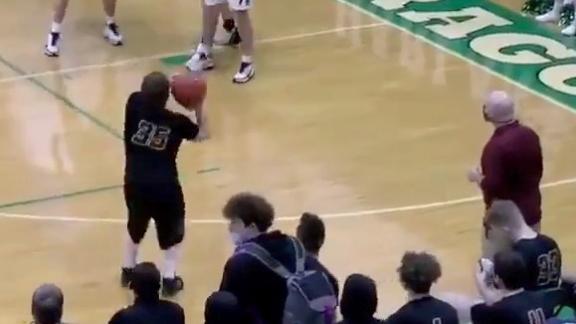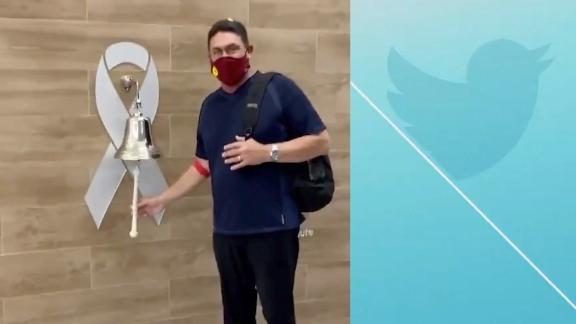Five Italian tennis players who were suspended after being caught up in a major gambling investigation are accusing the sport's governing body of trying to hide documents they claim will show much higher-ranked players also bet on matches.

In a federal motion filed Aug. 30, an attorney for the five players accuses the Association of Tennis Professionals (ATP) of abusing court rules that allow it to file documents in a pending suit under a hyper-secret classification known as "professional eyes only."
The label means that only attorneys in the case can talk about the contents. "At this point, I can't even share the information in them with my clients," says the players' attorney, Robert Elgidely.
The documents are part of a 2009 suit brought by the players, all of whom were suspended after an investigation turned up evidence that they wagered on matches. Potito Starace, the top Italian player, who was then ranked 31st in the world, placed five bets totaling $130. Daniele Bracciali, a 258th-ranked player, was found to have made 50 bets of about $7 each. The suspensions ranged from 100 to 270 days.
As soon as the penalties were handed down, a spokesman for the Italian Tennis Federation accused the ATP of overreacting, calling its action "out of proportion with the size of infringements committed by the two players."
Their suit, filed in the Middle District of Florida, claims that the ATP violated its "fiduciary duty" to them by, among other things, "discriminately targeting them as low-ranked, less prominent professional tennis players ... and by ignoring more serious violations ... by high-ranked, more prominent professional tennis players in order to avoid negatively impacting its revenue and reputation."
The new motion in the case claims that the ATP's confidential designations in the case have not been made "in good faith" and are "not warranted."
Elgidely is asking the court to reclassify 18 separate documents to a lower level of secrecy so he can at least discuss them with his clients. They include depositions by Gayle Bradshaw, the ATP's Administrator of Rules & Competition, Mark Young, the CEO of the ATP's American operations, and Jeff Rees, the head of league's anti-corruption unit.
"My clients have the burden of proof and these documents go to the heart of their case," says the Miami-based attorney.
Reached early Tuesday, John F. MacLennan, an attorney for the ATP, deferred all comment to the league. A spokesman has yet to reply.
The deposition of Rees promises to be especially interesting, since he co-authored a 2008 report that found there was "a strong indication" gamblers profited from inside information in 45 matches played over five years.
That report was triggered by an August 2007 match in which Nikolay Davydenko, then the world's fourth-ranked player, lost to an opponent who was ranked 87th in a match in Sopot, Poland. The largest Internet gambling site in Europe, Betfair, voided $7 million in bets on the match, calling it suspicious that Davydenko went from being a heavy favorite to an underdog just before the match began. He was later cleared of wrongdoing.
Since then, Rees, an ex-London cop, has been put in charge of a new anti-corruption unit in tennis. The Tennis Integrity Unit has kept a low profile trying to weed out bettors who befriend players in an effort to glean inside information. It's also meted out minor suspensions to players like 156th-ranked Daniel Koellerer, who put odds on tennis matches on his web site.But while the TIU goes about its work, professional tennis -- if not the ATP -- continues to encourage, even profit from, legal betting on its matches. Betfair is a sponsor of the Australian Open and, according to The New York Times, pays Tennis Australia a cut of every dollar wagered on matches during the tournament. "We're not opposed to gambling," a spokesman for the event told The Times. "It is part of our Australian culture and it is widely accepted."
If the ATP is really interested in showing it's got a handle on the balancing act of encouraging legal gambling while keeping its players pure, a little openness in this case wouldn't be a bad place to start.
UPDATE: Kate Gordon of the ATP responds: "The ATP and Tennis Integrity Unit investigate any and all alleged violations of the Uniform Tennis Anti-Corruption Program and diligently and uniformly enforce the rules, regardless of the identity of the player involved. We take the issue very seriously and continuously educate our members about the risks and consequences involved. We're proud that our sport and players have an overwhelmingly positive image, and that incidents like this are few and far between."
File Under ...
Ever think your partner is cheating you on line calls? Here's a great hidden video thread by amateurs who secretly recorded their matches, just to document their partners' calls.







